Related Research Articles

Jacques Marie Émile Lacan was a French psychoanalyst and psychiatrist. Described as "the most controversial psycho-analyst since Freud", Lacan gave yearly seminars in Paris, from 1953 to 1981, and published papers that were later collected in the book Écrits. Transcriptions of his seminars, given between 1954 and 1976, were also published. His work made a significant impact on continental philosophy and cultural theory in areas such as post-structuralism, critical theory, feminist theory and film theory, as well as on the practice of psychoanalysis itself.
Psychoanalytic literary criticism is literary criticism or literary theory that, in method, concept, or form, is influenced by the tradition of psychoanalysis begun by Sigmund Freud.
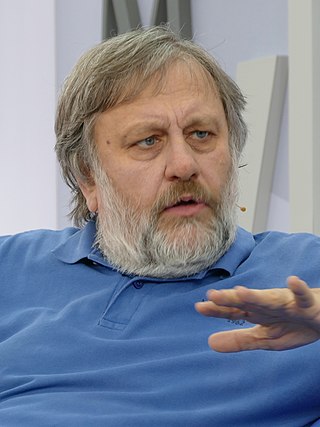
Slavoj Žižek is a Slovenian philosopher, cultural theorist and public intellectual. He is the international director of the Birkbeck Institute for the Humanities at the University of London, visiting professor at New York University and a senior researcher at the University of Ljubljana's Department of Philosophy. He primarily works on continental philosophy and political theory, as well as film criticism and theology.

In psychology, sublimation is a mature type of defense mechanism, in which socially unacceptable impulses or idealizations are transformed into socially acceptable actions or behavior, possibly resulting in a long-term conversion of the initial impulse.
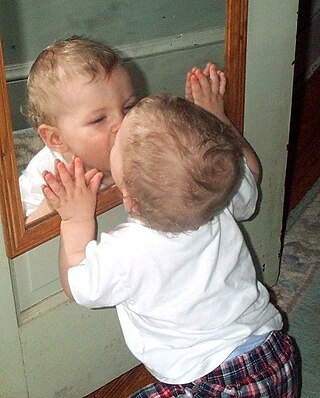
The mirror stage is a concept in the psychoanalytic theory of Jacques Lacan. The mirror stage is based on the belief that infants recognize themselves in a mirror (literal) or other symbolic contraption which induces apperception from the age of about six months.
In continental philosophy and psychoanalysis, jouissance is the transgression of a subject's regulation of pleasure. It is linked to the division and splitting of the subject involved, which spontaneously compels the subject to transgress the prohibitions imposed on enjoyment and to go beyond the pleasure principle. Beyond this limit, pleasure then becomes pain, before this initial "painful principle" develops into what Jacques Lacan called jouissance; it is suffering, epitomized in Lacan's remark about "the recoil imposed on everyone, in so far as it involves terrible promises, by the approach of jouissance as such". He also linked jouissance to the castration complex, and especially to the aggression of the death drives.
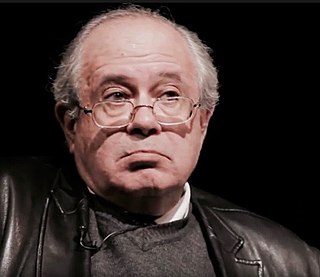
Jacques-Alain Miller is a psychoanalyst and writer. He is one of the founding members of the École de la Cause freudienne and the World Association of Psychoanalysis which he presided from 1992 to 2002. He is the sole editor of the books of The Seminars of Jacques Lacan.
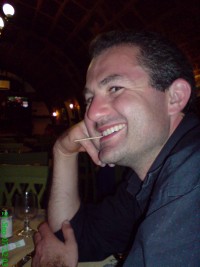
Saul Newman is a British political theorist who writes on post-anarchism. He is professor of political theory at Goldsmiths College, University of London.
In continental philosophy, the Real refers to the demarcation of reality that is correlated with subjectivity and intentionality. In Lacanianism, it is an "impossible" category because of its opposition to expression and inconceivability. The Real Order is a topological ring (lalangue) and ex-ists as an infinite homonym.
[T]he real in itself is meaningless: it has no truth for human existence. In Lacan's terms, it is speech that "introduces the dimension of truth into the real."

The Imaginary is one of three terms in the psychoanalytic perspective of Jacques Lacan, along with the Symbolic and the Real. Each of the three terms emerged gradually over time, undergoing an evolution in Lacan's own development of thought. "Of these three terms, the 'imaginary' was the first to appear, well before the Rome Report of 1953…[when the] notion of the 'symbolic' came to the forefront." Indeed, looking back at his intellectual development from the vantage point of the 1970s, Lacan epitomised it as follows:
"I began with the Imaginary, I then had to chew on the story of the Symbolic ... and I finished by putting out for you this famous Real."
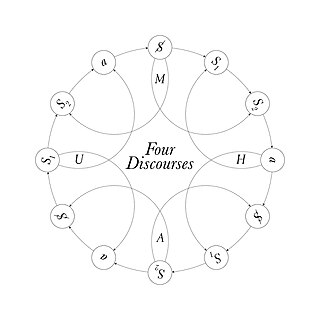
Four discourses is a concept developed by French psychoanalyst Jacques Lacan. He argued that there were four fundamental types of discourse. He defined four discourses, which he called Master, University, Hysteric and Analyst, and suggested that these relate dynamically to one another.

The Four Fundamental Concepts of Psychoanalysis is the 1978 English-language translation of a seminar held by Jacques Lacan. The original was published in Paris by Le Seuil in 1973. The Seminar was held at the École Normale Supérieure in Paris between January and June 1964 and is the eleventh in the series of The Seminar of Jacques Lacan. The text was published by Jacques-Alain Miller.

Luis de Miranda is a philosopher and novelist. His earlier books, written in French, have been translated into English, Chinese, Swedish, among other languages. A PhD from the University of Edinburgh, he previously graduated in philosophy at Pantheon-Sorbonne University and in economics at HEC Paris. Since 2018, Luis de Miranda is a philosophical practitioner and member of the Swedish Society for Philosophical Practice, and an academic researcher in Sweden.
Yannis Stavrakakis is a Greek–British political theorist. A member of the Essex School of discourse analysis, he is mainly known for his explorations of the importance of psychoanalytic theory for contemporary political and cultural analysis and for his discourse studies on populism.
Lacanianism or Lacanian psychoanalysis is a theoretical system that explains the mind, behaviour, and culture through a structuralist and post-structuralist extension of classical psychoanalysis, initiated by the work of Jacques Lacan from the 1950s to the 1980s. Lacanian perspectives contend that the human mind is structured by the world of language, known as the Symbolic. They stress the importance of desire, which is conceived of as perpetual and impossible to satisfy. Contemporary Lacanianism is characterised by a broad range of thought and extensive debate between Lacanians.
François Recanati is a French analytic philosopher and research fellow at the College de France, and at the Centre National de la Recherche Scientifique. Many of his works focus on the philosophy of language and mind.
The Utopia Experiment was an experiment by Dylan Evans, set up in 2006 at Netherton Farm, near Culbokie on the Black Isle peninsula in the Scottish highlands. It involved a group of volunteers improvising a post-apocalyptic lifestyle. It was time-limited to 18 months, and was originally intended to serve as both a learning community and a working community.
Lorenzo Chiesa is a philosopher, critical theorist, translator, and professor whose academic research and works focus on the intersection between ontology, psychoanalysis, and political theory.
Bruce Fink is an American Lacanian psychoanalyst and a major translator of Jacques Lacan. He is the author of numerous books on Lacan and Lacanian psychoanalysis, prominent among which are Lacan to the Letter: Reading Écrits Closely, The Lacanian Subject: Between Language and Jouissance (1995), Lacan on Love: An Exploration of Lacan's Seminar VIII and A Clinical Introduction to Lacanian Psychoanalysis: Theory and Technique.
Muriel Drazien in New York, was a psychoanalyst working first in Paris and then in Rome, a Lacanian and one of the three Tripode that fostered the teaching of Jacques Lacan in Italy.
References
- 1 2 3 4 "Dylan Evans: Biography". Archived from the original on 22 April 2009. Retrieved 1 November 2021.
- ↑ Evans, Dylan (2000). Rethinking emotion: New research in emotion and recent debates in cognitive science (PhD). London School of Economics and Political Science. Retrieved 25 June 2021.
- ↑ Dylan Evans, "No God, but value in art of worship", Sydney Morning Herald, 4 May 2005]
- ↑ Evans, Dylan "[www.dylan.org.uk/lacan.pdf From Lacan to Darwin]", in The Literary Animal; Evolution and the Nature of Narrative, eds. Jonathan Gottschall and David Sloan Wilson, Evanston: Northwestern University Press, 2005
- ↑ Hannah Fearn, "Surprise twist in 'fruitbatgate' row", Times Higher Education, 18 November 2010
- ↑ How's your risk intelligence? Archived 21 February 2010 at the Wayback Machine , Mark Henderson, The Times, 18 January 2010, retrieved 17 May 2010
- ↑ "Letters: Harsh judgments on the pope and religion". The Guardian . London. 15 September 2010. Retrieved 16 September 2010.
- ↑ Katherine Donnelly, "Woman in bat-sex row is expert nutritionist," The Independent, 18 May 2010
- ↑ Hannah Fearn, "Sex life of fruit bat lands lecturer in hot water", Times Higher Education, 17 May 2010
- ↑ Hannah Fearn, "Disciplinary proceedings halted in 'fruitbatgate' case", Times Higher Education Supplement, 5. July 2010
- ↑ Daniel O'Carroll, "Fruit-bat-gate lecturer begins legal battle over sexual harassment", Irish Scentral, 2. Jule 2010
- 1 2 "Bill No: 2010 750 JR" "Date Accused". Archived from the original on 4 July 2011. Retrieved 10 May 2011.
- ↑ "UCC lecturer has sanctions quashed". The Irish Times . Retrieved 1 November 2021.
- ↑ "Dylan Evans: The Utopia Experiment". Archived from the original on 7 May 2018. Retrieved 7 May 2018.
- 1 2 The Utopia Experiment: A radical crash course in self-sufficient living, James Durston, The Independent , 19 July 2007, retrieved 17 May 2010
- 1 2 Anjana Ahuja (8 June 2006). "Home is where the yurt is..." The Times . Retrieved 18 May 2009.
- ↑ Apocalypse now, Ross Anderson, The Times , 26 April 2007, retrieved 18 May 2007
- ↑ "My Private Utopia". Npr.org.
- ↑ "The Utopia Experiment, an interview with author Dylan Evans". Irishtechnews.ie. 14 April 2015. Retrieved 1 November 2021.
- ↑ "Beyond Originality". Iai.tv. 10 October 2015.
- 1 2 "Dylan Evans". The Guardian .
- ↑ "Search". Paperplus.co.nz.